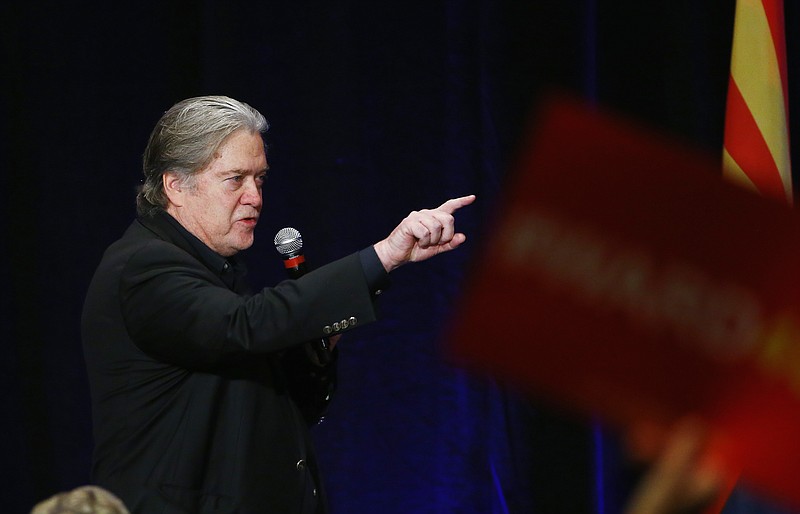It's a "populist nationalist conservative revolt," from which "nobody can run and hide."
That's how former White House chief strategist and Breitbart provocateur Steve Bannon framed his looming "war" last weekend when speaking to a group of religious conservatives.
Bannon's enemies are not progressive Democrats. Rather, they're establishment conservatives.
He's fantasizing over an internal purge. A civil war, if you will.
Such talk should come as no surprise to anyone following right-wing politics. Bannon's kind have long focused their political crosshairs on the likes of Senate Majority Leader Mitch McConnell, Speaker of the House Paul Ryan and our own Sen. Bob Corker.
To challenge and potentially replace these and other Republican elites, Bannon is recruiting a crop of outsider candidates.
It's motley crew to say the least. As an Associated Press story from last weekend noted, they include "a convicted felon, a perennial candidate linked to an environmental conspiracy theory and a Southern lawmaker known for provocative ethnic and racial comments."
But while Bannon salivates over economic nationalism and anti-globalism, it doesn't seem his roster of rabble rousers has much in common, save a distaste for GOP mainstays and a flare for opportunism.
"The main thing that binds them together is a rejection of the Republican Party establishment, a rejection of the political elites, the financial elites and the media elites," says a former Bannon aide who now serves as an adviser to the pro-Trump PAC Great America Alliance.
Such is the current state of the Republican Party at the national level.
The Weekly Standard's Bill Kristol framed the dilemma well in an editorial earlier this month: The GOP is torn between insurgents who "appeal to the lowest-common-denominator concerns of voters," and elites "roam(ing) like zombies on a terrain they can no longer navigate."
And while it's hard to muster sympathy for zombie-like conservative Washington power brokers, what happens if Bannon has his way and they are drop-kicked into the sunset?
If their replacements share little ideological or philosophical common ground except a hatred for all things elite - a sentiment that helped Donald Trump win the White House - where does their movement go after an election win?
This question brings to mind a bit from Peggy Noonan's most recent piece in the Wall Street Journal. In it she told of a previous conversation she had with some Republican lawmakers in D.C. in which she noted the "terrible irony" of the most recent presidential election:
"Donald Trump was the only one of the 17 GOP Primary candidates who could have gone on to win the presidency. Only he had the uniqueness, the outside-the-box-ness to win. At the same time Mr. Trump was probably the only one of the 17 who would not be able to govern, for reasons of temperament, political experience and essential nature."
He won largely due to his outsider status, an indictment of the Washington "in" crowd. Yet aside from signing his name to executive orders, the president's governing wins have proven scant.
A cadre of insurgent, ideologically incoherent upstarts would likely find themselves in a similar predicament.
"We're here! Um, now what?"
What the Republican Party does not need is an upheaval anchored in impulse and outsider (read: inexperienced) status alone. That lowers the bar to a height any crass demagogue can clear. Instead, the GOP would benefit from refocusing on ideals, a commitment to turning those ideals into proposed policies, and moving those measures through Congress.
The American people - enough of them, anyway - would support such a scenario. That, after all, is why Republicans are in power.
More lip service, though, will only fuel the possible success of Bannon's revolt.
Contact David Allen Martin at davidallenmartin423@gmail.com and follow him on Twitter @DMart423.

